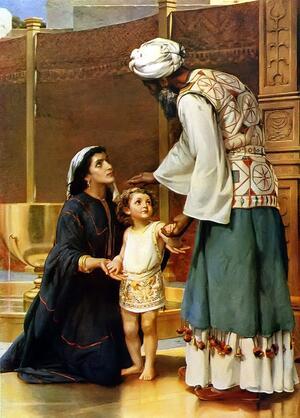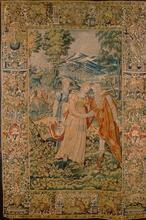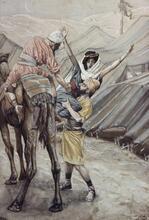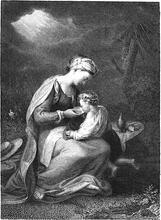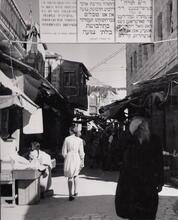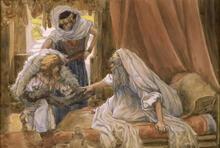Hannah: Midrash and Aggadah
Hannah is depicted by the Rabbis as a righteous woman who was devout in her observance of the commandments, especially the pilgrimage to the Tabernacle, and tested by God through her infertility. Her prayer to God at the Tabernacle is the basis for much of the rabbinic conception of the Amidah prayer. Some traditions portray her trying to arouse heavenly mercy, while others present the stubborn and daring stance of a woman who refused to accept the divine decree. The midrash also elaborates on Hannah’s relationship with her rival wife, Peninnah, who is portrayed as a consistent source of cruelty.
Hannah is depicted by the Rabbis as a righteous woman who was devout in her observance of the commandments, especially those of pilgrimage to the Tabernacle, Menstruation; the menstruant woman; ritual status of the menstruant woman.niddah (the laws governing family purity), the taking of During the Temple period, the dough set aside to be given to the priests. In post-Temple times, a small piece of dough set aside and burnt. In common parlance, the braided loaves blessed and eaten on the Sabbath and Festivals.hallah from dough, and the kindling of the SabbathShabbat lights. Her barrenness does not attest to her having sinned; rather, God desired her prayer, as in the case of the Matriarchs who were infertile before finally being blessed with children. The Rabbis learned many important The legal corpus of Jewish laws and observances as prescribed in the Torah and interpreted by rabbinic authorities, beginning with those of the Mishnah and Talmud.halakhot of prayer from Hannah’s entreaty at Shiloh and her prayer became a model of prayer that God answers. The major prophet Samuel was born by merit of Hannah’s prayer; not only did his mother impart life to him, she also saved his life when he was a small boy.
Hannah’s Barrenness
The Bible does not specify how long Hannah was barren, a period that, according to the A type of non-halakhic literary activitiy of the Rabbis for interpreting non-legal material according to special principles of interpretation (hermeneutical rules).midrash, extended for nineteen years. Why was this righteous woman forced to suffer so many years of childlessness? In their answer to this question, the Rabbis cite Prov. 27:21: “For silver—the crucible, for gold—the furnace, and a man is tested by his praise.” The jeweler puts silver into the fire, and gold into the furnace, and fires every material in accordance with its strength. Thus, in this metaphor of the Rabbis, God refines in the crucible each of the righteous according to his or her strength: He refined Sarah for twenty-five years, Rebekah for twenty, and Hannah for nineteen. This midrash thus places Hannah together with the righteous Matriarchs, albeit with slightly less endurance than the latter.
The Rabbis relate that Hannah was Elkanah’s first wife. Only after he saw that she had not borne any children during their first ten years of marriage did he marry Peninnah (Pesikta Rabbati 43). The Codification of basic Jewish Oral Law; edited and arranged by R. Judah ha-Nasi c. 200 C.E.Mishnah rules that if a couple has been married for ten years without having any children, the husband is obligated to take another (or additional) wife, in order to fulfill the commandment to be fruitful and multiply (M The widow of a childless man whose brother (yavam or levir) is obligated to marry her to perpetuate the brother's name (Deut. 25:5Yevamot 6:6). The midrash maintains that Elkanah was compelled to marry Peninnah because of Hannah’s barrenness, thus explaining his preference for Hannah, his first wife.
According to another tradition, Hannah took the initiative for Elkanah’s marriage to Peninnah. Knowing that she was childless, she said to herself: If I tell Elkanah to take an additional wife, God will see that I brought a rival wife into my house, and He will remember me (Pesikta Rabbati 43). The midrash thereby likens the narrative of Elkanah and Hannah to the stories of the Patriarchs and Matriarchs (Sarah and Hagar, Rachel and Bilhah), in which the beloved wife is barren and initiates the taking of an additional wife in order to produce offspring.
Quarrels with Peninnah
The tension between Peninnah and Hannah because of the latter’s barrenness is portrayed in I Sam. 1:6: “Moreover, her rival, to make her more miserable, would taunt her that the Lord had closed her womb.” In the midrashic expansion, Peninnah would annoy Hannah by asking her: “Did you buy a sweater for your eldest son?,” “Did you buy a shirt for your second son?” (Midrash Samuel 1:8). According to a different midrashic tradition, early in the morning Peninnah would question Hannah: “Aren’t you getting up to wash your children’s faces before they go to school?” And six hours later she would ask: “Aren’t you going to greet your children when they come home from school?” (Pesikta Rabbati 43). In this midrashic retelling, Peninnah would harness ordinary everyday activities as barbs against Hannah, by reminding her, at all hours of the day, of the difference between them.
In yet another midrashic account, during mealtimes at Shiloh, when Elkanah was distributing the offering among his children, Peninnah would tell him: “Give to this son of mine his portion,” “To this son of mine you did not give his portion,” all in order to vex Hannah (Pesikta Rabbati 43). In this midrashic tableau, Peninnah would harass Hannah indirectly, so that she could not be directly accused of unseemly behavior, while nevertheless hurting Hannah to the core. These various expositions stress Peninnah’s difficulty in living in the shadow of another wife. She knew that Hannah was Elkanah’s beloved, but nevertheless sought to gain some recognition from Elkanah, either in their home or in the apportioning of the offerings.
Hannah the Pilgrim
As the midrash tells it, Hannah would regularly go on pilgrimage to the Tabernacle at Shiloh and pray there; by merit of this activity, God heard her prayer and blessed her with children (Pesikta Rabbati 43). On A seven-day festival to commemorate the Exodus from Egypt (eight days outside Israel) beginning on the 15th day of the Hebrew month of Nissan. Also called the "Festival of Mazzot"; the "Festival of Spring"; Pesah.Passover that year Hannah went up to Shiloh with all Israel. When she saw all the people, she implored God: “Master of all the worlds, this is a propitious hour. Remember me, O Lord, by the merit of Your people, take note of me in Your salvation.” In her prayer Hannah mentioned two actions: remembrance and taking note, both of which were performed by God, as it is said (I Sam. 1:19): “the Lord remembered her” and (I Sam. 2:21) “For the Lord took note of Hannah” (Statements that are not Scripturally dependent and that pertain to ethics, traditions and actions of the Rabbis; the non-legal (non-halakhic) material of the Talmud.Aggadat Bereshit [ed. Buber] 21:1).
Elkanah Seeks to Console Hannah
Aware of Hannah’s distress, Elkanah attempted to console her with both word and deed. I Sam. 1:5 states that in order to enhearten Hannah, her husband would always give her “one, a double portion [manah ahat apayim]” of the offering at Shiloh. According to one midrashic explanation, Elkanah would give her her portion with a pleasant demeanor; another midrashic exposition has him giving her the finest portion. Despite these gestures, Hannah would still weep, and one who weeps does not eat (because they lose their appetite) (Midrash Samuel 1:8).
Elkanah also sought to comfort Hannah with words, as in I Sam. 1:8: “Her husband Elkanah said to her, ‘Hannah, why are you crying and why aren’t you eating? Why are you so sad?’” The midrash learns from the triple usage of “why” that her husband tried to console her with the stories of the three barren Matriarchs. He told her: “Would Sarah, who was childless, sit and cry all the day? Would Rebekah, who was barren, not eat? Would Rachel, who was childless, sit by herself, depressed?” (Pesikta Rabbati 43). With these examples, Elkanah tried to infuse Hannah with hope and cause her to eat of the sacrifice and stop crying.
Another tradition explains Elkanah’s declaration (I Sam. 1:8): “‘Am I [anokhi] not more devoted to you than ten sons’: God, who said [Ex. 20:2] ‘I [anokhi] the Lord am your God,’ is your portion. He is more devoted to you than ten sons” (Midrash Samuel 1:9).
The Prayer of Hannah
The Rabbis note that the entire Hannah narrative in I Sam. 1 employs double, or repetitious, wording. Peninnah doubly vexed her: “her rival, to make her miserable [ve-ka’asatah … gam ka’as]” (v. 6); Elkanah gives her a double portion: “one, a double portion” (v. 5); Hannah’s weeping is described in repetitious language: “weeping all the while [u-vakhoh tivkeh]” (v. 10), as is the Lord’s requested gazing upon her: “If You will look upon [im ra’oh tireh]” (v. 11); and her vow is similarly couched: “And she made this vow [va-tidor neder]” (ibid.). This midrash emphasizes the tumultuous nature of the emotions at play in the story of Hannah. The magnitude of Peninnah’s vexing of Hannah is matched by the depth of the latter’s weeping, which explains the intensity of Hannah’s prayer and the vow that she took at Shiloh (Midrash Samuel 1:9).
The contents of Hannah’s prayer and the manner in which she attempted to persuade God to give her a son are the subject of various midrashim. Some traditions portray her trying to arouse heavenly mercy, while others present the stubborn and daring stance of a woman who refused to accept the divine decree.
Hannah’s attempt to arouse divine compassion: the midrash learns from the verse “Now Hannah was praying in her heart” (v. 13) that she was praying for matters that concerned her heart (that is, what rested on her heart—her breasts). She said: “Master of the Universe, of all that you created in woman, You did not create anything for naught. Eyes with which to see, ears with which to hear, a nose with which to smell, a mouth with which to talk, hands with which to do work, feet with which to walk, and breasts with which to nurse. These breasts that You placed on my heart—what for? not to nurse from them? Give me a son and I will nurse with them!” (BT Berakhot 31b). Hannah addresses God as man’s Creator. It was He who created her as a woman, and she asks Him to let her fulfill her body’s destiny as a mother.
Hannah uses a special term in her prayer: “Lord of Hosts” (v. 11). The Rabbis assert that Hannah was the first person since God created His world to use the name “Hosts.” She said to Him: “Master of the Universe! there is a heavenly host and an earthly one. The heavenly host neither eat nor drink, are not fruitful and don't multiply, and do not die, but live forever. The earthly host eat and drink, are fruitful and multiply, and die. I do not know to which host I belong, whether to the heavenly host or the earthly one. If I am of the heavenly host, for I do not give birth, then I do not eat or drink [as Hannah did at Shiloh], and I shall not die, but live forever. But if I am of the earthly host, let me then eat and drink, give birth, and die” (Pesikta Rabbati 43). As in the previous midrash, Hannah wonders about her destiny as a person, but views herself as part of humankind as a whole, different from the angels.
Hannah tries to persuade God to give her a son by playing upon her merits. In her prayer she mentions the term “Your maidservant” three times (v. 11): “the suffering of Your maidservant […] and not forget Your maidservant, and if You will grant Your maidservant [...].” The Rabbis ask why this phrase appears three times and answer: Hannah said to God: “Master of the Universe! You have created three death tests [a wordplay based on the similarity between amatkha, Your maidservant, and mitah, death] for woman [You have given women three tests, and transgressing one of them is liable to result in her demise]: niddah, the taking of hallah, and the kindling of the Sabbath lights. Have I violated any of these?” (BT Berakhot 31b; see above). Hannah compares her situation to a woman who is sentenced to death, which is how she feels since she has no children. She asks God to let her become pregnant by merit of her being His maidservant, a woman who is scrupulous in her observance of the commandments that are reserved exclusively for women.
In another exegetical approach, Hannah is presented as protesting against God’s own behavior. The Rabbis derive from the unusual wording of v. 10—“She prayed to the Lord,” with the preposition al (instead of the usual el), literally meaning: “She prayed concerning the Lord”—that this was an accusation directed against the Lord (BT Berakhot 31b).
An additional tradition depicts Hannah as complaining about the injustice in God’s world. Hannah proclaimed: “Master of the Universe! Abraham did Your bidding, and You gave him a son when he was a hundred years old, while Ahab, who was a sinner and idolater, begot seventy sons! Sarah did Your bidding, and You gave her a son when she reached the age of ninety, while the wicked Jezebel bore seventy sons!” (Midrash Samuel 2:1).
Yet another midrash shows Hannah as forcing God to heed her prayer. She told Him: “Master of the Universe! If You will look upon [with the double wording im ra’oh tireh] the suffering of Your maidservant’ [v. 11]—‘if You will look [im ra’oh]’—it will be well; and if not, ‘tireh’ [i.e., I will force You to heed it]. How so? I will go and be alone with another man with the knowledge of my husband Elkanah. Thus I will be suspected of infidelity, and in order to test me, I will be given the water of the Suspected adulteresssotah to drink. Since I will emerge innocent from this test, I will be blessed with a child, for it is said in Num. 5:28: ‘But if the woman has not defiled herself and is pure, she shall be unharmed and able to retain seed’; if the charges against a woman are proven to be unfounded, she will be blessed with a child. And so I will have the child that I wanted. Will You make of Your Torah a lie?” (BT Berakhot 31b). This midrash portrays Hannah’s desperate straits. She is even willing to be suspected as a sotah and debase herself in the humiliating ceremony of being forced to drink the water of bitterness, so that the Lord will give her children. In order to “force” God to listen to her, she uses His Torah as a weapon.
An alternate tradition incorporates the above approaches. In this retelling, Hannah says to God: “Lord of Hosts [v. 11]—Master of the Universe! of all the hosts of hosts that you created in Your world, is it so difficult in Your eyes to give me a single son?” The Rabbis follow this account with a parable on Hannah’s conduct. This is comparable to a king who made a banquet for his servants. A pauper came and stood at the threshold and asked them, “Give me a bite to eat,” but no one took any notice of him. He forced his way into the presence of the king, to whom he said: “My lord the king, from the whole feast that you made, is it so difficult in your eyes to give me a single bite?” (BT Berakhot 31b). This parable presents Hannah as a mendicant begging at peoples’ doors, whose miserable condition is starkly contrasted with the opulence of the king’s feast. The beggar does not merely ask the servants at the gate; he manages to enter the royal palace and stands before the king, demanding his help. Hannah arouses God’s compassion because of her deplorable state, but also because of the daring she revealed by standing directly before Him. Hannah did not ask Eli the priest to act as an intermediary; she enters the sanctuary of the Lord and she herself addresses God.
In her prayer Hannah asks of God: “and if you will grant Your maidservant a male child [zera anashim, literally, seed of men]” (v. 13), which is the basis for the various Rabbinical depictions of Hannah’s most secret hopes and desires. According to one view, she asked for a child who would be especially prominent among men. Another, and diametrically opposed, opinion maintains that Hannah requested “seed” that would be absorbed among people, that is, who would not be exceptional. As R. Dimi described this: “Nether too tall nor too short, neither small nor big and clumsy, neither too pale nor too red, neither overly wise nor stupid.” Two other views present Hannah’s words not as a hope, but as a prophecy that would be realized. According to one position, Hannah wanted “seed,” a child, who would anoint two “men”—two kings. This came to pass, because Samuel anointed both Saul and David as kings. Another opinion has Hannah asking for an offspring who would be accounted as two men; and Samuel was accounted as both Moses and Aaron, as it is said (Ps. 99:6): “Moses and Aaron among His priests, Samuel, among those who call on His name” (BT Berakhot 31b).
God said: “Hannah, since the Creation, no one except you has praised Me with the words ‘Lord of Hosts.’ By your life, your son shall begin his prophecy with those words.” Samuel did, in fact, commence his prophecy (I Sam. 15:2) with the words: “Thus said the Lord of Hosts.” God said: “Hannah, you said ‘Hosts’ and increased My myriads, and I will increase your myriads [that is, your offspring].” Hannah’s offspring included Heman (I Chron. 25:5), who had fourteen sons and three daughters (Midrash Samuel 2:5).
Hannah’s Prayer as a Paradigm of Accepted Prayer
The prayer of Hannah was unique among prayers, since it was answered without being heard. The midrash cites a series of Biblical prayers in descending order of length and ascending potency. Some prayers are answered after thirty years, as with Joseph, whose dreams came to pass when he was thirty years of age (Gen. 41:46). Other prayers are granted after three days, such as the prayer of Jonah in the fish’s belly (Jonah 2:1). Yet other prayers are answered before they have had time to leave the mouth of the one who cries out, such as that of Moses: “Then the Lord said to Moses: ‘Why do you cry out to Me? Tell the Israelites to go forward’” (Ex. 14:15). Hannah’s prayer, however, was in a whisper heard by none and already granted (Midrash Samuel 4:1).
The Rabbis state that several important laws of prayer may be learned from Hannah’s prayer. The words “I am the woman who stood here beside you” (v. 26) teach that Hannah prayed while standing, from which the Rabbis concluded that she recited the Lit. "standing." The primary element of each of the three daily prayer services.Amidah prayer (the Shemoneh Esreh). The laws derived from Hannah’s prayer also relate to the Amidah:
- It is said of Hannah: “In her wretchedness [or: bitterness of soul], she prayed to the Lord” (v. 10), thus showing that one should stand up to recite the Amidah only in a reverent frame of mind (BT Berakhot 30b).
- From the words “now Hannah was praying in her heart” (v. 13) we learn that the one reciting the Amidah must have intent.
- The words “only her lips moved” (ibid.) teach that thinking to oneself the words of the prayer is not sufficient; they must be pronounced with one’s lips.
- The words “but her voice could not be heard” (ibid.) indicates that, even though a person must pronounce the words, he must not raise his voice during the Amidah.
- “So Eli thought she was drunk” (ibid.) teaches that one who is intoxicated may not pray (BT Berakhot 31a).
- When Hannah meets Eli for the second time, she tells him “I am the woman who stood here beside you” (v. 26), from which the Rabbis deduce that Eli also stood while Hannah prayed; consequently, it is forbidden to sit within four cubits of someone reciting the Amidah and one must stand until the person finishes (BT Berakhot 31b).
It is said that Hannah “kept on praying before the Lord” (v. 12), from which we learn that whoever is persistent in prayer will be answered. The opposite approach, however, also exists: that superfluous words should not be added to one’s prayer. This is learned from Prov. 14:23: “From all toil there is some gain, but idle chatter is pure loss.” According to this view, Hannah shortened Samuel’s life because of her excessive prayer. When she said to Elkanah: “I will bring him. For when he has appeared before the Lord, he must remain there for good” (v. 22), Samuel’s fate was sealed: he would live only to the age of fifty, when the Levites retire from their Temple duties (Num. 8:25). (Midrash Samuel 2:9).
Hannah and Eli
When Eli saw Hannah praying, he thought that she was inebriated and demanded of her “How long will you make a drunken spectacle of yourself?” (v. 14), from which the Rabbis derive that anyone who sees his fellow acting in an improper manner must reproach him for this. Hannah answered Eli: “I have drunk no wine or other strong drink” (v. 15), thus teaching that one who is wrongly suspected of something must immediately inform the accuser that he is blameless and not rely on his own knowledge of his innocence.
V. 15 has Hannah responding to Eli: “And Hannah replied: ‘Oh, no, my lord.’” In the midrashic expansion of this exchange, Hannah said to him: “The spirit of divine inspiration does not rest on you if you suspect me of this”; or, according to another tradition: “You are no lord in this manner, nor is the Shekhinah [Divine Presence] with you, since you took a harsh view of my conduct and did not know that I am a woman embittered of soul” (BT Berakhot 31a-b).
Hannah said to Eli: “I am a woman embittered of soul” (v. 15)—“my soul is embittered because of the bitter rival wife.” According to another exegetic tradition, she told him: “I am one of those women who receives her gifts the hard way, like Sarah and the other righteous women” (Midrash Samuel 2:11).
Hannah’s explanation to Eli of her behavior is followed by: “‘Then go in peace,’ said Eli, ‘and may the God of Israel grant you what you have asked’” (v. 17). This response leads the Rabbis to teach that one who wrongly suspects his fellow must placate him and even bless him. Eli’s reply is an attempt to mollify Hannah for having accused her of being drunk; consequently, she also received his blessing (BT Berakhot 31b).
Another tradition interprets Eli’s statement “and may the God of Israel grant you what you have asked” as a prophecy about the future. The wording she’elatekh (“what you have asked”) is written deficiently, without the letter alef, since he told her: “This son that you will bear shall receive many treasures [li-shlol harbeh shelal] of the Torah” (Midrash Samuel 2:12).
The Birth of Samuel
The Rabbis apply to Hannah Ps. 145:19: “He fulfills the wishes of those who fear Him,” for she prayed to God, who did not send her away empty-handed, but heeded her prayer and gave her all that she asked of Him (Pesikta Rabbati 43).
Regarding the great boon that befell Hannah, that she would give birth to Samuel, the Rabbis relate that every day during that period a Divine voice heard throughout the world would go forth and proclaim: “A righteous one will arise named Samuel.” All the women of that generation wanted to give birth to him and every woman who bore a son named him Samuel, but when they saw how he behaved, they said: “Such a one is Samuel? This is not that Samuel.” When Hannah gave birth to Samuel, they saw how he deported himself and they said: “We see that this is the one” (Midrash Samuel 3:4).
The midrash states that Hannah became pregnant on Rosh Hashanah, because the Bible says of her (v. 19) “and the Lord remembered her [va-yizkereha],” and Rosh Hashanah is called (Lev. 23:24) “a sacred occasion commemorated [zikhron] with loud blasts” (BT Rosh Hashanah 11a). Hannah was one hundred and thirty years old when she became pregnant, as was Jochebed (Midrash Samuel 4:1); this midrash is part of the Rabbinic trend to compare Samuel with Moses (see below).
I Sam. 2:21 states that the Lord took note of Hannah and “she conceived and bore three sons and two daughters.” The midrash relates that when Hannah began to bear children, Peninnah was punished for her misdeeds. Hannah would give birth to one child, and Peninnah would bury two; Hannah bore four, and Peninnah buried eight. When Hannah was pregnant with her fifth child, Peninnah feared that now she would bury her last two children. What did she do? She went to Hannah and told her: “I know that I have sinned against you. I beg you, pray for me, so that my two remaining sons will live.” Hannah prayed to God, saying: “Please, leave her the two sons and let them live.” God responded: “By your life, they deserve to die, but since you have prayed that they live, I will call them by your name.” Thus, even though Hannah bore only five children, she says in her song (I Sam. 2:5): “While the barren woman bears seven,” for Peninnah’s two sons were reckoned as Hannah’s (Pesikta Rabbati 43). This midrashic exegesis also explains the end of the verse: “While the barren woman bears seven, the mother of many is forlorn.” Hannah, who had been childless, had five children of her own, and two more who were attributed to her, while Peninnah, who had given birth to many children (ten), became forlorn.
Another Rabbinic resolution of “While the barren woman bears seven” asserts that Samuel was the equal of Moses and Aaron, and therefore should be counted as three. According to a third explanation, Hannah lived to see Samuel’s two children, and grandchildren are accounted as one’s own children (Pesikta Rabbati 43).
Samuel’s Being Brought to Shiloh
The Rabbis attest to Hannah’s special care of Samuel. She would generally make a yearly pilgrimage to the Tabernacle at Shiloh (see above). After Samuel’s birth she had to fulfill her vow and bring her son to Eli at Shiloh. Samuel had not been weaned, but was already old enough to ride on his father’s shoulders, and therefore, according to the School of Shammai, was no longer a “child” who is exempt from the obligation of pilgrimage (M Hagigah 1:1). Hannah herself was also required to make the pilgrimage, to fulfill the commandment of rejoicing on the Festival ( i.e. eat a portion from the offering): “and rejoice with your household” (Deut. 14:26). Nonetheless, she remained behind with Samuel, whom she pampered lest he be weakened by the journey (BT Hagigah 5b–6a).
One tradition attests that Samuel was two years of age when Hannah brought him to Shiloh. Samuel came to the Tabernacle and saw people standing by their sacrifices, but without offering them. He asked them: “Why don’t you slaughter them?” They replied: “We are waiting for the priest to come.” Samuel replied: “But the slaughter of a sacrifice is fit, even if performed by a nonpriest.” They stood and slaughtered their offerings. When Eli came and saw that they had already killed the animals, he asked them: “Who permitted you to slaughter?” They answered: “Some lad.” He ordered them to bring this lad to him. When they did so, Eli demanded of him: “How do you know this?” Samuel responded: “Is it written in the Torah: ‘And the priest shall slaughter’? For it is written [Lev. 1:5]: ‘The bull shall be slaughtered … and Aaron’s sons shall offer’; consequently, the slaughtering that precedes the offering may be done by one who is not a priest, as well.” Eli responded: “You have spoken well. Nonetheless, one who teaches the law in the presence of his teacher is liable to death from Heaven, and you taught the law in my presence.” Eli wanted to punish him, but Hannah came and prostrated herself before him. She implored the priest (I Sam. 1:26): “‘Please, my lord! As you live, my lord, I am the woman who stood here beside you and prayed to the Lord’—do not punish the child who was born in answer to my prayer.” Eli said to her: “Let me punish him [i.e., with death], and the Lord will give you a son greater than he.” Hannah responded (v. 27): “‘It was this boy I prayed for,’ and I do not want another. Anyway, he is neither mine nor yours, but God’s: I, in turn, hereby lend him to the Lord. For as long as he lives he is lent to the Lord (v. 28).” This tradition indicates the uniqueness of Samuel, who, even as a small child, surpassed Eli. It demonstrates not only Hannah’s ability to give Samuel life, but also her continued protection of her son. The midrash continues that her last words in this verse, “For as long as he lives he is lent [sha’ul] to the Lord,” were uttered under the spirit of divine inspiration, for as long as Samuel lived, so did Saul (Shaul) (BT Berakhot 31b; Midrash Samuel 3:6).
In another midrashic tableau, when Eli saw the lad, he blessed Elkanah that all the children that God would give him would be from this righteous woman [i.e., from Hannah] (Midrash Samuel 6:3).
The Song of Hannah
According to the Rabbis, the song of Hannah is depicted in Ps. 113:9: “He sets the childless woman among her household as a happy mother of children. Hallelujah.” Hannah was the childless woman “set among her household,” and the Lord made her happy with children, three sons and two daughters, “as a happy mother of children.” Hannah said, “Master of the Universe! what must I do? I will recite song and melody to You: ‘Hallelujah [literally, praise the Lord]’” (Pesikta Rabbati 43).
The midrash relates that Hannah’s song saved the wicked. When she sang her song (I Sam. 2:6)—“The Lord deals death and gives life, casts down into Sheol and raises up”—she saved the company of Korah who had been swallowed up by the ground (as portrayed in Num. 16:31–33). They descended to Sheol until Hannah prayed for them, whereupon they rose (Midrash Samuel 5:12).

